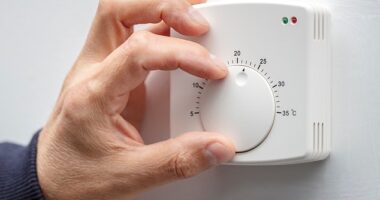INFLATION in the UK fell last month as the price of clothes and food dropped, according to official figures.
The Office for National Statistics (ONS) said Consumer Prices Index (CPI) inflation decreased to 0.3% in November, down from 0.7% in September.
The inflation rate fell by more than expected of analysts, who had predicted that inflation would come in at 0.6% for the month.
The latest figures come after the inflation rate plunged from 1% to 0.2% in August due to the Eat Out to Help Out scheme.
This represented the lowest level of CPI inflation, which measures how prices have changed over a year, since December 2015.
Clothes and shoe prices typically fall each year between June and July in summer sales as retailers prepare for autumn ranges to come in, and then rise before sales towards the end of the year, the ONS said.
What does inflation matter?
INFLATION is a measure of the cost of living. It looks at how much the price of goods, such as food or televisions, and services, such as haircuts or train tickets, has changed over time.
Usually people measure inflation by comparing the cost of things today with how much they cost a year ago. The average increase in prices is known as the inflation rate.
The government sets an inflation target of 2%.
If inflation is too high or it moves around a lot, the Bank of England says it is hard for businesses to set the right prices and for people to plan their spending.
High inflation rates also means people are having to spend more, while savings are likely to be eroded as the cost of goods is more than the interest we’re earning.
Low inflation, on the other hand, means lower prices and a greater likelihood of interest rates on savings beating the inflation rate.
But if inflation is too low some people may put off spending because they expect prices to fall. And if everybody reduced their spending then companies could fail and people might lose their jobs.
See our UK inflation guide and our Is low inflation good? guide for more information.
However, throughout 2020 this pattern has been different, with increased sales in March and April, which was likely a result of lockdown.
Following a smaller rise between July and August, clothing prices then increased sharply in October.
And between October and November, clothing and footwear prices slumped by 2.6%, compared with a rise of 1% over the same two months last year.
It comes as several retailers including Amazon and Boots offered Black Friday discounts across the whole of the month this year.
Ahead of the official sale bonanza on November 27, shoppers were predicted to spend £2million a minute.
It came as crisis-hit high street names made record price cuts to avoid being stuck with a mountain of stock following the second lockdown in England.
Jonathan Athow, ONS deputy national statistician for economic statistics, said: “With significant restrictions in place across the UK, inflation slowed, predominantly due to clothing and food prices.
“Also, after several months of buoyant growth, second-hand car prices fell back a little.”
Laith Khalaf, financial analyst of investment platform AJ Bell, said: “We shouldn’t set too much store by one month’s inflation figure, particularly this time around when a second national lockdown meant the statisticians weren’t able to collect all of the usual data.
“However, the broader picture remains one of low inflation and that spells low interest rates for the foreseeable future.
“We can expect inflation to tick up next spring, when the basis for comparison moves into the post-pandemic era and the big drop in fuel prices falls out of the equation in March.”















